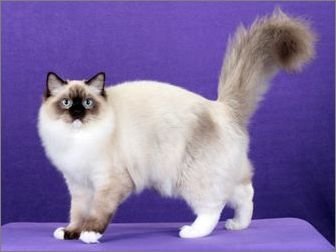Birman Cat History
Although the origin of the Birman breed remains speculative, most cat fanciers agree that this rare cat is one of the oldest breeds. There are many theories regarding its origination, some believe it is a descendant of the French Himalayan, while others believe it resembles the Siamese.
This particular breed has also been thought to derive from the sacred cats that are said to have guarded the Burman temples. In tales handed down through history, it is said that the Birman’s coat changed to a golden color everywhere but its feet which in turn assisted the monks in thwarting off attackers as this was the color of the goddess of which they worshipped.
Those that say the Birman, while more stout in appearance, bears a striking resemblance to the Siamese, have also stated that they believe when the pure white Burman temple cat’s altered in color, it was more than likely the result of a stray Siamese who fathered a few litters of kittens.
But, the tales of this superb breed do not end at the temples of Burman, this exquisite cat also made its arrival in Europe in the nineteen twenties. A lone survivor on a treacherous boat ride from Burman to Europe, this incredible female is said to have given birth to a single female who is believed to be the direct ancestor of today’s Birman. The one and only kitten she produced is also rumored to have been crossed with a Siamese.
Once again, the Birman finds itself a place in history as this time it was gravely in danger of extinction after World War II. In order to ensure the survival of this unique and majestic breed, the last and only known surviving Birman's were then out crossed once again, but this time it is believed a Persian was the breed of choice.
Birman Cat Health Problems
With inbreeding being the only means to keep this breed from extinction, it would seem this feline would be prone to extensive hereditary illnesses and flaws. However, despite these practices, the Birman is a generally healthy breed of cat. But, as most breeds do, the Birman does have a couple of little quirks that must be recognized and considered before making the decision to bring one home. The first issue is one of utmost importance. The Birman is known to be extremely sensitive to anesthesia and a Birman can also be either an A or B blood type, making these two problems a cause for immediate concern if surgery is ever required.
Although this breed is considered to be that of a longhair, its coat is not very thick or heavy; however, the Birman is extremely susceptible to developing hairballs. A consultation with your veterinarian will help you with deciphering which foods and dietary supplements will assist in preventing or alleviating this condition. Symptoms of hairball problems include loss of appetite and lethargy. If any of these symptoms arise, it is best to visit your veterinarian.
While the Birman’s coat is not a heavy one, a regular grooming regiment is essential. It will not only keep the cats coat smooth and healthy, but it wall also assist in preventing hairballs.
Another issue worth considering is the fact that Birman’s are not an active breed, therefore, while consulting with your veterinarian about foods and supplements for preventing hairballs, it might also be a good idea to inquire about weight control as well.
Any cat lover looking to own a cat that is rare, unique and elegant is certain to find true magic with the exquisite Birman.
Although the origin of the Birman breed remains speculative, most cat fanciers agree that this rare cat is one of the oldest breeds. There are many theories regarding its origination, some believe it is a descendant of the French Himalayan, while others believe it resembles the Siamese.
This particular breed has also been thought to derive from the sacred cats that are said to have guarded the Burman temples. In tales handed down through history, it is said that the Birman’s coat changed to a golden color everywhere but its feet which in turn assisted the monks in thwarting off attackers as this was the color of the goddess of which they worshipped.
Those that say the Birman, while more stout in appearance, bears a striking resemblance to the Siamese, have also stated that they believe when the pure white Burman temple cat’s altered in color, it was more than likely the result of a stray Siamese who fathered a few litters of kittens.
But, the tales of this superb breed do not end at the temples of Burman, this exquisite cat also made its arrival in Europe in the nineteen twenties. A lone survivor on a treacherous boat ride from Burman to Europe, this incredible female is said to have given birth to a single female who is believed to be the direct ancestor of today’s Birman. The one and only kitten she produced is also rumored to have been crossed with a Siamese.
Once again, the Birman finds itself a place in history as this time it was gravely in danger of extinction after World War II. In order to ensure the survival of this unique and majestic breed, the last and only known surviving Birman's were then out crossed once again, but this time it is believed a Persian was the breed of choice.
Birman Cat Health Problems
With inbreeding being the only means to keep this breed from extinction, it would seem this feline would be prone to extensive hereditary illnesses and flaws. However, despite these practices, the Birman is a generally healthy breed of cat. But, as most breeds do, the Birman does have a couple of little quirks that must be recognized and considered before making the decision to bring one home. The first issue is one of utmost importance. The Birman is known to be extremely sensitive to anesthesia and a Birman can also be either an A or B blood type, making these two problems a cause for immediate concern if surgery is ever required.
Although this breed is considered to be that of a longhair, its coat is not very thick or heavy; however, the Birman is extremely susceptible to developing hairballs. A consultation with your veterinarian will help you with deciphering which foods and dietary supplements will assist in preventing or alleviating this condition. Symptoms of hairball problems include loss of appetite and lethargy. If any of these symptoms arise, it is best to visit your veterinarian.
While the Birman’s coat is not a heavy one, a regular grooming regiment is essential. It will not only keep the cats coat smooth and healthy, but it wall also assist in preventing hairballs.
Another issue worth considering is the fact that Birman’s are not an active breed, therefore, while consulting with your veterinarian about foods and supplements for preventing hairballs, it might also be a good idea to inquire about weight control as well.
Any cat lover looking to own a cat that is rare, unique and elegant is certain to find true magic with the exquisite Birman.


 RSS Feed
RSS Feed